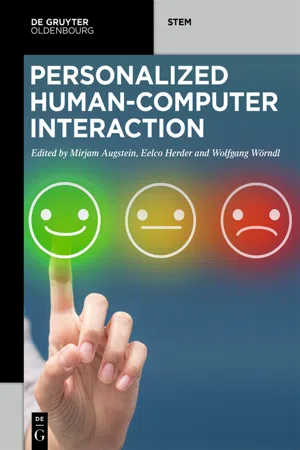Abstract
Personalized systems are systems that adapt themselves to meet the inferred needs of individual users. The majority of personalized systems mainly rely on data describing how users interacted with these systems. A common approach is to use historical data to predict users’ future needs, preferences, and behavior to subsequently adapt the system to these predictions. However, this adaptation is often done without leveraging the theoretical understanding between behavior and user traits that can be used to characterize individual users or the relationship between user traits and needs that can be used to adapt the system. Adopting a more theoretical perspective can benefit personalization in two ways: (i) letting systems rely on theory can reduce the need for extensive data-driven analysis, and (ii) interpreting the outcomes of data-driven analysis (such as predictive models) from a theoretical perspective can expand our knowledge about users. However, incorporating theoretical knowledge in personalization brings forth a number of challenges. In this chapter, we review literature that taps into aspects of (i) psychological models from traditional psychological theory that can be used in personalization, (ii) relationships between psychological models and online behavior, (iii) automated inference of psychological models from data, and (iv) how to incorporate psychological models in personalized systems. Finally, we propose a step-by-step approach on how to design personalized systems that take user traits into account.
1 Introduction
Personalization is performed by adapting aspects of systems to match individual users’ needs in order to improve efficiency, effectiveness, and satisfaction. Current personalization strategies are mainly data-driven in the sense that they are based on the way users have been and are interacting with a system, after which the system is dynamically adapted to match inferred user needs. The more theory-driven counterparts of personalization are often designed based on general knowledge about how user traits influence user needs, and how these needs influence the requirements of a system. Systems are adapted to individual users based on a set of rules. Although both strategies are used separately, the knowledge gained from both strategies could be combined to achieve greater personalization possibilities.
To mitigate personalization challenges, current research has primarily focused on using historical data that describe interaction behavior. Using these data, personalization strategies are developed that predict users’ future interactions. The prediction of these future interactions is often done without leveraging the understanding of the relationship between user behavior and user traits. In other words, predictions are made without considering the root cause of certain behavior that users are showing. A prominent direction using this approach is the field of recommender systems in which historical behavioral data are used to alter the order of items in a catalog (from highest predicted relevance to lowest predicted relevance), with the goal of making users consume more items or helping them to find relevant items more easily [69].
By adopting a more theoretical perspective (often based on psychological literature), the root cause of behavior can be identified and thereby benefit personalization opportunities. Using a theoretical perspective can benefit personalization in two ways. (i) A large body of theoretical work can be used to inform personalized systems without the need of extensive data-driven analysis. For example, research has shown that it might be beneficial to adapt the way course material is presented to match students’ working memory capacity [42]. And (ii) including theory can help to interpret the results gained from the data-driven perspective and thereby meaningfully expand our knowledge about users. For example, research on music players has demonstrated that different types of people base their decisions on what to listen to on different sources of information [29].
Although adopting a more theoretical perspective by considering the relationship between user behavior and user traits has been shown to benefit personalization, this theoretical perspective comes with theoretical and methodological challenges. A first challenge is to identify and measure user traits that play a role in the needs for personalization (e. g., cognitive style [77], personality [14], susceptibility to persuasive strategies [19]) and to capture these traits in a formal user model. A second challenge is to infer the relevant user traits from interaction behavior (e. g., inferring user preferences from historical ratings, or inferring a person’s personality from the content they share on social media). A third challenge is to identify the aspects of a system that can be altered based on these user traits. In certain cases, this is straightforward (e. g., altering the order of a list of items based on predicted relevance), while in other cases the required alterations can be more intricate and require more thought to implement (e. g., altering the way in which information is presented visually to match a user’s cognitive style).
While the aforementioned challenges are interconnected, they are often addressed in isolation. The current chapter provides an overview of work that relied on user traits for several (system) aspects:
-
introduction of psychological models that are currently used in personalization;
-
psychological models that have been linked to online behavior;
-
automatic inference of psychological models from behavioral data;
-
incorporating psychological models in personalized systems or systems for personalization.
The literature discussed throughout the chapter can serve as starting points for theory-grounded personalization in certain applications (e. g., e-learning, recommendations) and content domains (e. g., movies, music). Finally, the chapter concludes with a blueprint for designing personalized systems that take user traits into consideration.
2 Psychological models in personalization
Psychological models serve to explain how aspects of the environ...
